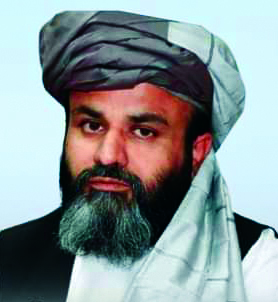QUETTA: The overnight emergence of a cleric on to the provincial political stage has sent tremors in the stronghold of Baloch nationalists, who look at the mammoth protests led by Maulana Hidayatur Rehman with suspicion and fear.
Maulana Hidayat, a member of the centralist Jamaat-e-Islami (JI), has shot to fame after the recent protest rallies and sit-ins in Gwadar that urge the government to give the people of the small city and Makran division their due rights.
The Maulana has managed to pull thousands of people in his protests. He has also staged a sit-in in which around 40,000 to 45,000 people including women have participated.
Son of a fisherman, Maulana Hidayat has been talking about local issues – like illegal fishing of Sindh’s trawlers in Balochistan’s territorial waters; unavailability of electricity and water in Gwadar and ban on Iranian goods particularly fuel – and has managed to mobilize a large number of people.
The Maulana also announced that if he ends his sit-in in the wake of acceptance of all his demands, he will start a long march from Gwadar to Quetta over the issue of missing persons in April, 2022.
His stand for the rights of Balochistan is similar to that of nationalist parties, like the Balochistan National Party (BNP-M) and the National Party (NP).
Read More: Gwadar rising
All his demands except for the one related to cancellation of liquor licenses of three wine stores in Gwadar are about the issues the people of Gwadar and other districts of Makran division are facing. However, the nationalists and elected lawmakers have distanced themselves from the ongoing protests.
Neither Aslam Bhootani – who was elected to the National Assembly as an independent candidate from Gwadar – nor Mir Hamal Kalmati – who was elected to the Balochistan Assembly from the city on the BNP-M’s ticket – have ever turned up at Gwadar sit-ins.
According to sources close to these lawmakers, both Bhootani and Kalmati are of the opinion that as elected representatives they have been taking up these issues in legislatures and that those who don’t have parliamentary forum resort to street protests.
They also suspect that the Maulana has the backing of the establishment which, according to them, shows extra tolerance to the Maulana’s harsh language and attitude with the officials who have been approaching him for negotiation.
Nationalists say if they had adopted such an attitude or used such harsh language, they would have been booked in a number of cases including of treason and would have been thrown behind bars.
The leaders of nationalist parties are said to be in close contact with each other for devising a strategy to regain the space they have lost to Maulana Hadayat and have planned to start their activities in Gwadar once the Maulana ends his ongoing sit-in.
However the political analysts believe that nationalist forces would definitely benefit if Maulana Hidayat starts its long march on the missing persons’ issue which the nationalists have also been taking up in and outside the parliament for long.
Although the Jamiat Ulema-e-Islam-Fazl (JUI-F) is quite popular in the Pashtoon-dominated northern and central districts of Balochistan including Kharan, Washuk, Noshki, Mastung, Kalat, Soorab and Khuzdar, it has failed to make any inroads in Makran division.
However, Mualana Hidayat is the second JI leader from South Balochistan to rise to prominence.
Late Maulana Abdul Haq Baloch, JI Balochistan former chief, was also elected from Makran division in 1985 non-party elections and got fame for his firm stance over Balochistan’s rights.
Maulana Haq, who actually belonged to Gwadar, couldn’t return to the assembly in the subsequent party-based general elections, however. Gwadar has been a stronghold of nationalist forces for long but sometimes personalities backed by “Islamabad” have also been winning seats from there.
















